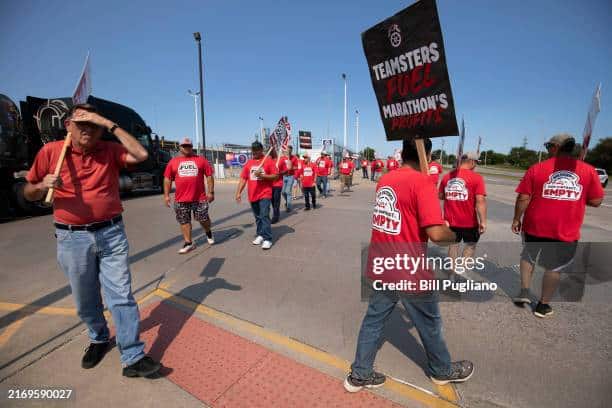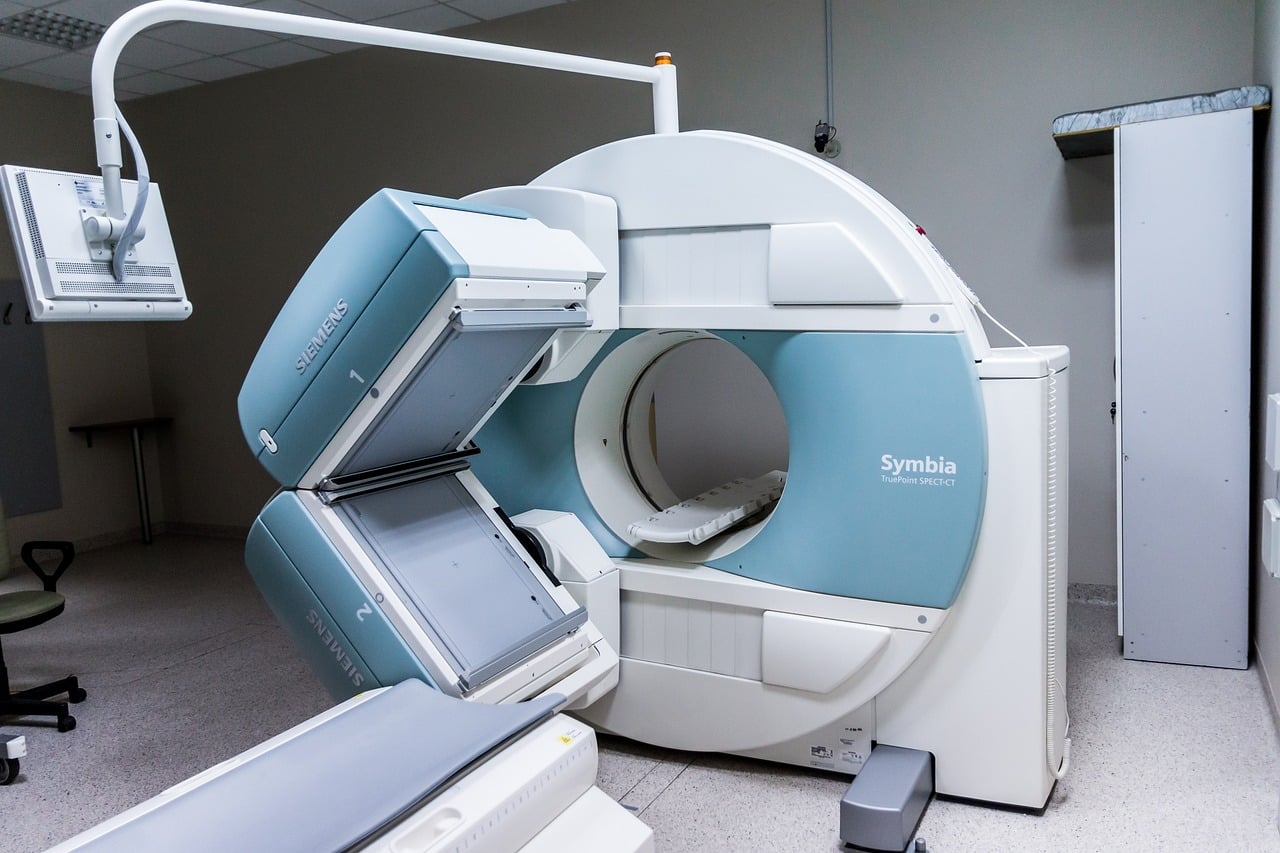On September 18, Sean O’Brien, President of the International Brotherhood of Teamsters, announced that the union would not endorse either Kamala Harris or Donald Trump for president in the 2024 election. The move is somewhat unusual for the union since it has backed a presidential candidate in all but three elections since 1960, the last time being 1996.
This lack of an endorsement is not a welcome sign for the Kamala Harris campaign, as the union has backed Democratic nominees for president in every election since 2000, including the president she’s serving with, Joe Biden, in 2020. Donald Trump did not win the Teamsters’ endorsement, either; the union has not backed a Republican presidential candidate since 1988. The 2024 Republican National Convention, however, was the first ever time a Teamsters president spoke at the Republicans’ nomination ceremony.
According to O’Brien, the union’s refusal to endorse a candidate comes after they were unable to secure pledges from either candidate that they would support the union’s stance on several critical labor issues. While Trump welcomed the news that the union wouldn’t be backing Harris, the Harris campaign pointed out that she still had the endorsement of rank-and-file Teamsters members and other major labor groups.
The support of union leaders and members will play a major role in the 2024 election, as many live and work in critical Rust Belt swing states like Michigan, Wisconsin, and Pennsylvania. Trump won each of these states narrowly over Hillary Clinton, and Joe Biden flipped them back in 2020. It remains to be seen how large an impact the Teamsters’ lack of an endorsement will have on the outcome of the presidential election, but it could be significant.
Joe Biden And Union Workers
After declining to endorse either Bill Clinton or Bob Dole in the 1996 presidential election, the Teamsters Union endorsed the Democratic candidates in the next six presidential elections: Al Gore in 2000, John Kerry in 2004, Barack Obama in 2008 and 2012, Hillary Clinton in 2016, and Joe Biden in 2020.
Throughout his congressional career, vice presidency, 2020 presidential campaign, and most of his presidency, Biden has boasted strong union support. Since assuming the presidency in 2021, Biden’s made many moves that have proven popular with both union leadership and rank and file members. Both the American Rescue Plan Act of 2021 and the Inflation Reduction Act of 2022 contained many provisions to benefit American laborers. Biden also expressed support for union workers to organize and strike: in 2021, he publicly supported the right of workers to organize just as Amazon workers were preparing to do so; in 2023, he visited striking autoworkers in Michigan, becoming the first sitting president to ever join a picket line.
Biden’s strong support among union workers faltered slightly when, in 2022, he signed a law passed by Congress that forced union workers to sign a contract the administration brokered between the workers and the management. Calling it a tough decision, Biden stated that the law was necessary to keep the then-unstable supply chains steady for the holiday season. Donald Trump had also been making appeals and gains with union workers in the run-up to the 2024 election. Before Joe Biden dropped out of the presidential race on July 21, an internal poll among Teamsters members showed Biden leading Trump 44% to 36%, with 6% going to third-party candidate Robert F. Kennedy, Jr.
Why The Teamsters Made No Endorsement This Year
As they’ve done with previous presidential candidates, the leaders of the Teamsters held roundtables with Harris and Trump to discuss and ask questions about issues important to union workers. According to O’Brien, leadership sought important commitments from both candidates before deciding whether to endorse either of them. Among those commitments were to “not interfere in critical union campaigns or core Teamsters industries,” “to honor our members’ right to strike,” and to “ensure the interests of working people are always put before Big Business.” O’Brien said that the union was unable to secure pledges from either candidate and thus made no endorsement.
Despite the Teamsters’ long history of supporting Democratic candidates, O’Brien made clear that a candidate’s political party made no difference in who the union endorsed. Instead, he and the union wanted to know what each candidate was doing to help American workers. He also noted that they didn’t want “false hopes and dreams masqueraded with rhetoric” but rather “direct dialogue” and concrete answers. He pointed out, for instance, that while Harris expressed support for the Protecting the Right to Organize (PRO) Act, an important Teamsters’ priority, she didn’t explain how she would get it passed into law.
O’Brien also said straw polls of its members would play a role when considering which candidate to endorse. In contrast to Biden, however, Harris trailed significantly in two polls conducted among Teamsters members, garnering 34% to Trump’s 59.6% in a third-party survey and 31% to 58% in a phone poll. The union did not release the number of participants or margins of error for either poll, however. Despite Trump’s lead in the polls, O’Brien said that the candidate’s lack of commitment to the union’s major priorities ultimately won out in the decision to make no endorsement.
The Trump And Harris Campaigns Respond
Although Trump didn’t receive the union’s endorsement, the candidate said it was “a great honor” that they didn’t endorse Harris either since the Teamsters have had a long history of endorsing Democratic presidential candidates. He also proudly noted that 60% of the union members had backed him in the straw poll, a major turnaround from him trailing Biden by 8% in a previous straw poll. Trump campaign spokesperson Karoline Leavitt said that the poll showed that the “hardworking men and women” of the Teamsters wanted Trump back in the White House and that Trump would stand up for them if he became president again.
While Harris is the first Democratic presidential candidate in decades to not receive the Teamsters’ endorsement, her campaign spokesperson Lauren Hitt pointed out that many local Teamsters chapters already endorsed Harris. In fact, both the president of the Teamsters’ Black Caucus and several members of local chapters questioned the leadership’s decision and implied it was out of touch with the feelings of the rank and file members. Hitt also reiterated Harris’s statement to the Teamsters leadership on Monday, where the vice-president pledged she would “look out for the Teamsters rank-and-file no matter what” because “they always have been and always will be the people she fights for.”
Conclusion: State Of The Unions
Though the Teamsters union won’t back Harris or Trump in November’s election, several other major unions have already endorsed Harris, including the National Education Association, the Service Employees International Union, the United Auto Workers, and the AFL-CIO. Another major union, the International Association of Fire Fighters (IAFF), has not officially endorsed a candidate yet, though they backed Biden in 2020.
Union workers played a significant role in the 2016 and 2020 elections, particularly in Rust Belt states like Michigan that flipped from Obama in 2012 to Trump in 2016 to Biden in 2020. According to AFL-CIO president Liz Shuler, 1 of every 5 voters in major swing states are union workers. With the outcome of the 2024 election likely to come down to the results in these states, the decision of the Teamsters to not endorse Harris or Trump could have a noticeable effect on the union vote in these states. Both candidates are certainly hoping to appeal to union voters to help secure their chances at victory.








